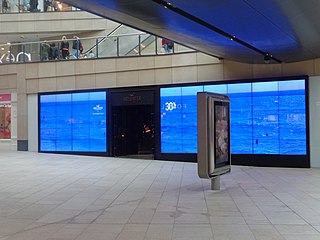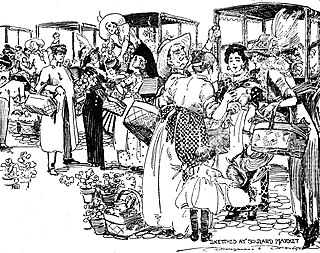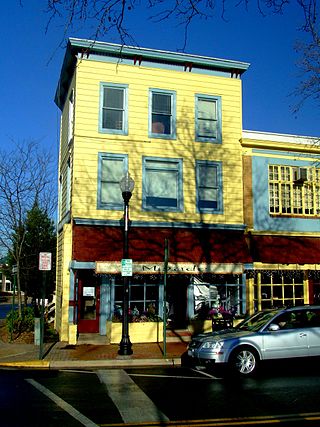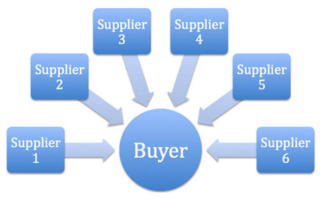Related Research Articles

An auction is usually a process of buying and selling goods or services by offering them up for bids, taking bids, and then selling the item to the highest bidder or buying the item from the lowest bidder. Some exceptions to this definition exist and are described in the section about different types. The branch of economic theory dealing with auction types and participants' behavior in auctions is called auction theory.

Sales are activities related to selling or the number of goods sold in a given targeted time period. The delivery of a service for a cost is also considered a sale. A period during which goods are sold for a reduced price may also be referred to as a "sale".
Discounts and allowances are reductions to a basic price of goods or services.

Real estate agents and real estate brokers are people who represents sellers or buyers of real estate or real property. While a broker may work independently, an agent usually works under a licensed broker to represent clients. Brokers and agents are licensed by the state to negotiate sales agreements and manage the documentation required for closing real estate transactions. Buyers and sellers are generally advised to consult a licensed real estate professional for a written definition of an individual state's laws of agency.
A real estate contract is a contract between parties for the purchase and sale, exchange, or other conveyance of real estate. The sale of land is governed by the laws and practices of the jurisdiction in which the land is located. Real estate called leasehold estate is actually a rental of real property such as an apartment, and leases cover such rentals since they typically do not result in recordable deeds. Freehold conveyances of real estate are covered by real estate contracts, including conveying fee simple title, life estates, remainder estates, and freehold easements. Real estate contracts are typically bilateral contracts and should have the legal requirements specified by contract law in general and should also be in writing to be enforceable.
Gazumping occurs when a seller accepts a verbal offer on the property from one potential buyer, but then accepts a higher offer from someone else. It can also refer to the seller raising the asking price or asking for more money at the last minute, after previously verbally agreeing to a lower one. In either case, the original buyer is left in a bad situation, and either has to offer a higher price or lose the purchase. The term gazumping is most commonly used in the United Kingdom and Ireland, although similar practices can be found in some other jurisdictions.
A bid price is the highest price that a buyer is willing to pay for some goods. It is usually referred to simply as the "bid". In bid and ask, the bid price stands in contrast to the ask price or "offer", and the difference between the two is called the bid–ask spread. An unsolicited bid or purchase offer is when a person or company receives a bid even though they are not looking to sell.
Consignment is a process whereby a person gives permission to another party to take care of their property and retains full ownership of the property until the item is sold to the final buyer. It is generally done during auctions, shipping, goods transfer, or putting something up for sale in a consignment store. The owner of the goods pays the third-party a portion of the sale for facilitating the sale. Consignors maintain the rights to their property until the item is sold or abandoned. Many consignment shops and online consignment platforms have a set time limit at which an item's availability for sale expires. Within the time of contract, reductions of the price are common to promote the sale of the item, but vary by the type of item sold.

A business can use a variety of pricing strategies when selling a product or service. To determine the most effective pricing strategy for a company, senior executives need to first identify the company's pricing position, pricing segment, pricing capability and their competitive pricing reaction strategy. Pricing strategies and tactics vary from company to company, and also differ across countries, cultures, industries and over time, with the maturing of industries and markets and changes in wider economic conditions.

Commercial property, also called commercial real estate, investment property or income property, is real estate intended to generate a profit, either from capital gains or rental income. Commercial property includes office buildings, medical centers, hotels, malls, retail stores, multifamily housing buildings, farm land, warehouses, and garages. In many U.S. states, residential property containing more than a certain number of units qualifies as commercial property for borrowing and tax purposes.

A double auction is a process of buying and selling goods with multiple sellers and multiple buyers. Potential buyers submit their bids and potential sellers submit their ask prices to the market institution, and then the market institution chooses some price p that clears the market: all the sellers who asked less than p sell and all buyers who bid more than p buy at this price p. Buyers and sellers that bid or ask for exactly p are also included. A common example of a double auction is stock exchange.
In contract law, a land contract,, is a contract between the buyer and seller of real property in which the seller provides the buyer financing in the purchase, and the buyer repays the resulting loan in installments. Under a land contract, the seller retains the legal title to the property but permits the buyer to take possession of it for most purposes other than that of legal ownership. The sale price is typically paid in periodic installments, often with a balloon payment at the end to make the timelength of payments shorter than in the corresponding fully amortized loan. When the full purchase price has been paid including any interest, the seller is obligated to convey legal title to the property. An initial down payment from the buyer to the seller is usually also required.
Upselling is a sales technique where a seller invites the customer to purchase more expensive items, upgrades, or other add-ons to generate more revenue. While it usually involves marketing more profitable services or products, it can be simply exposing the customer to other options that were perhaps not considered.
A real estate trend is any consistent pattern or change in the general direction of the real estate industry which, over the course of time, causes a statistically noticeable change. This phenomenon can be a result of the economy, a change in mortgage rates, consumer speculations, or other fundamental and non-fundamental reasons.
A real estate transaction is the process whereby rights in a unit of property are transferred between two or more parties, e.g. in the case of conveyance one party being the seller(s) and the other being the buyer(s). It can often be quite complicated due to the complexity of the property rights being transferred, the amount of money being exchanged, and government regulations. Conventions and requirements also vary considerably among different countries of the world and smaller legal entities (jurisdictions).
In economics and finance, the price discovery process is the process of determining the price of an asset in the marketplace through the interactions of buyers and sellers.
Pay what you want is a pricing strategy where buyers pay their desired amount for a given commodity. This amount can sometimes include zero. A minimum (floor) price may be set, and/or a suggested price may be indicated as guidance for the buyer. The buyer can select an amount higher or lower than the standard price for the commodity. Many common PWYW models set the price prior to a purchase, but some defer price-setting until after the experience of consumption. PWYW is a buyer-centered form of participative pricing, also referred to as co-pricing.

A reverse auction is a type of auction in which the traditional roles of buyer and seller are reversed. Thus, there is one buyer and many potential sellers. In an ordinary auction also known as a forward auction, buyers compete to obtain goods or services by offering increasingly higher prices. In contrast, in a reverse auction, the sellers compete to obtain business from the buyer and prices will typically decrease as the sellers underbid each other.
A buyers club or buying club is a club organized to pool members' collective buying power, enabling them to make purchases at lower prices than are generally available, or to purchase goods that might be difficult to obtain independently.
A prior-free mechanism (PFM) is a mechanism in which the designer does not have any information on the agents' valuations, not even that they are random variables from some unknown probability distribution.
References
- 1 2 http://www.cryer.co.uk/glossary/p/poa.htm Glossary definition for POA
- ↑ AVOIDING BAIT PRICES